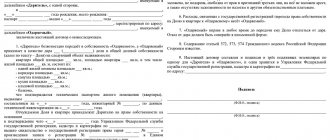Law
The procedure for drawing up donation agreements and subsequent re-registration of ownership rights is established by the following regulations:
- Civil Code of the Russian Federation.
- Fundamentals of legislation on notaries.
- Federal Law “On State Registration of Rights...”.
- Federal Law “On Cadastral Activities”.
- Federal Law “On State Registration of Real Estate”.
The Notary Law applies to the notarization of contracts. When donating a share in an apartment, a mandatory notarization of the contract is required.
What is an apartment share
Expert opinion
Stanislav Evseev
Lawyer. Experience 12 years. Specialization: civil, family, inheritance law.
The owner of the premises may be one person or several. If there are several co-owners, each of them owns a certain part of the property (house, apartment).
Moreover, property can be common or shared (Article 244 of the Civil Code of the Russian Federation). Common property means property without determining the shares of participants.
Their size depends on the number of co-owners. For example, in a privatized apartment for three people, each family member owns 1/3 of the housing.
With shared ownership, each owner owns a specific portion of the property. Moreover, the shares may be different.
How to properly gift a share in an apartment to a close relative, mother, daughter, son
The basic requirement when concluding transactions is the full legal capacity of the parties to the agreement. That is, citizens must reach the age of majority. The interests of minors are represented by their parents or other legal representatives (guardians, adoptive parents).
The share donation agreement is drawn up in writing. The rule applies regardless of the degree of relationship between the parties to the transaction. Oral alienation of real estate is prohibited. The agreement gains force after its signing.
A prerequisite is its notarization. The reason for contacting a notary is the need to conduct a transaction with shares in real estate.
The right of ownership to the alienated object arises after entering information into the Unified State Register.
Example. The head of the family decided to sign over his apartment to his son and daughter from his first marriage. Each of them was entitled to ½ part of the housing. Both children have reached adulthood. Therefore, their mother's consent was not required. The parties discussed all the main terms of the deal. The deed of gift was drawn up by a notary. On the same day, the papers were submitted to Rosreestr. A week later, the recipients received an extract from the Unified State Register of Real Estate.
Donation of residential premises
In general, the procedure for donating a room does not differ significantly from the transfer of an apartment or homeownership as a whole. To do this, you need to collect some documents, then draw up and sign an agreement. Recipients can be any person. The owner can donate his room to either a relative or a stranger.
Relatives
Most often, relatives of the owner act as recipients of property.
However, donation of this category has its own distinctive features. In this case we are talking about the degree of relationship. It defines some of the nuances of giving. If the transaction is made between close relatives or family members, such as spouses, children, parents, adoptive parents, grandparents, grandchildren, sisters, brothers, including half-siblings, no tax will be paid. The type of property being transferred does not matter in this case. This rule does not apply to everyone else, provided that the subject of the gift is real estate, a vehicle, a share, a share, or shares. That is, transactions with the specified types of property are taxed if the parties are not relatives.
To third parties
Outsiders can also receive any material assets as a gift. You don't have to be a relative or family member to do this. The procedure in this case is implemented according to general rules. It should be noted that a transaction with a stranger is taxable if the gift is a vehicle, a share, a share, a share, or real estate.
Agreement conditions
The donation is free of charge. There should be no counter-conditions in the agreement. Otherwise it can be challenged.
The contract must contain a clear description of the alienated property. The transfer of the share is carried out during the lifetime of the owner of the object.
Violation of any clause makes the gift agreement void or voidable.
Is the consent of the co-owners required for the alienation of part of the premises? Typically, consent is required in case of sale of property (Article 250 of the Civil Code of the Russian Federation).
When concluding a gift agreement there are some nuances. Only the allocated share can be given as a gift without the consent of the co-owners. An object in joint ownership can be donated only with the consent of the co-owners.
Arbitrage practice
Challenging a contract is problematic - you will need a huge amount of evidence confirming the validity of the claims.
But some people managed to do this, as confirmed by real court decisions:
- Decision No. 2-802/2018 2-802/2018~M-510/2018 M-510/2018 dated July 23, 2021 in case No. 2-802/2018;
- Decision No. 2-1096/2019 dated July 30, 2021 in case No. 2-5410/2018~M-4244/2018;
- Decision No. 2-127/2019 2-127/2019(2-5872/2018;)~M-5438/2018 2-5872/2018 M-5438/2018 dated July 23, 2021 in case No. 2-127/2019
After cancellation of the gift, the parties return to the original position, and the donor receives the gifted property back.
Methods
The donation of part of the housing occurs by concluding an agreement. However, sometimes citizens have to go to court. The reason is the death of the donor. If the recipient did not have time to register ownership, then the property of the testator is included in the inheritance. The legal successors of the property are the family members of the deceased subject.
Example. The plaintiff went to court. He asked to recognize the deed of gift as concluded, and the certificate issued by the notary as invalid. The plaintiff also asked to cancel the certificate of ownership. Justification of the requirements - a gift agreement was drawn up between the plaintiff (son from his first marriage) and the late citizen K. But the plaintiff did not have time to register ownership of the premises due to the death of the donor. The defendants were the heirs of the deceased subject. They knew about the conclusion of the gift agreement, however, they turned to a notary to register the inheritance. As a result, the plaintiff lost the property donated to him. The legal successors registered the ownership rights with the Federal Registration Service of the Omsk Region. Two defendants admitted the claims. Another claimed that he knew nothing about the existence of a gift agreement. Moreover, the agreement was not certified by a notary. Therefore, he asked to dismiss the claim. However, the court did not agree with the defendant's opinion. The deal was concluded before amendments were made to Federal Law No. 172-FZ. Therefore, notarization of the agreement was not required. The claims were satisfied.
Is it possible to refuse a deed of gift for a room?
It is not easy for the donor to cancel the concluded agreement. To do this, he needs specific claims against the donee. You cannot simply take a room because the donor has changed his mind.
In turn, the donee has the right to refuse the object of donation within three years. He will not need to explain the reasons for this. It is enough to write a corresponding application to Rosreestr. This can happen when, after registering a deed of gift, conflict situations arise between relatives.
If the donor has any claims regarding the contents of the donated property, he can return the room in court. The received positive court decision will become the basis for the return and restoration of the property rights of the former owner.
If difficulties or controversial situations arise, seek legal advice. You can get free legal assistance on our website. special window.
Now you know how to draw up a contract for donating a room in a communal apartment. We offer you a sample of 2021. However, keep in mind that each situation is individual. We recommend that you contact a duty lawyer.
Procedure
Transaction participants must perform the following actions:
- Collect the necessary documents.
- Prepare a draft agreement.
- Contact a notary.
- Prepare a deed of gift.
- Register ownership.
Procedure
Initially, the parties to the transaction need to contact a notary office. You can develop a draft agreement yourself or take it from a notary.
To conclude an agreement, you will need the appropriate papers. The notary establishes the identities of the participants and verifies their legal capacity.
At the same time, the parties to the agreement are explained their rights/responsibilities. The deed of gift is considered executed from the moment it is signed by the parties.
Data on the conclusion of the contract are entered into the state register. To avoid mistakes, you need to carefully check the text of the agreement.
Documentation
To prepare a deed of gift you will need:
- Passports of the donor and recipient.
- Documents for property (extract from the Unified State Register, cadastral passport).
- Extract from the house register.
- Consent of the spouse to the alienation of a share of the premises (if necessary).
- Confirmation of relationship.
If the latter document is available, the parties to the agreement are exempt from paying personal income tax (Article 217 of the Tax Code of the Russian Federation). The rule applies only to close relatives.
Expenses
At the conclusion of the deed, the parties to the deed incur certain costs. How much it costs to register a donation depends on the market price of the object.
For notarization of the transaction you will have to pay 0.5% of the value of the share. The minimum collection amount is 300 rubles. The maximum rate is 20 thousand rubles. The state duty is usually paid by the recipient.
Notary services are paid in addition to the basic tax. On average they amount to 5 thousand rubles. Details need to be clarified at the notary office.
Registration of rights is a separate cost item. When re-registering premises in an apartment building, the tax amount is 200 rubles. When registering an entire apartment, the copyright holder pays 2 thousand rubles.
Taxes
The only tax when concluding a deed of gift is personal income tax. Its size for residents of the Russian Federation is 13%. Non-residents pay 30%.
Who is exempt from paying income tax? Citizens who are close relatives do not pay personal income tax. This includes parents, children, spouses, brothers/sisters. The benefit also applies to grandparents.
Deadlines
You can conclude a deed of gift at any time. The parties to the contract determine the time to contact the notary independently.
How long does it take to register ownership? The beneficiary can submit papers at any time.
However, delaying the procedure is fraught with certain consequences. In the event of the death of the donor, the beneficiary will have to prove his rights to the property in court. Otherwise it will become part of the inheritance.
Registration of deed of gift
The procedure for drawing up an agreement is regulated by law. Initially, the parties need to agree on the key points of the agreement. One of them is the right to refuse the transfer of a gift. The reason may be the deterioration of the property status of the donor.
Next, the parties to the transaction should visit a notary. The link goes to the location of the apartment. You need to have documents with you. The notary will calculate the amount of the fee and provide details for payment. You can make a payment at any bank in the country. Notarization of the transaction occurs after payment of the fee.
The deed of gift is drawn up in triplicate. One is given to the donor, the second to the beneficiary, and the third remains with the notary.
How to transfer a share to a relative
There are several ways of alienation - sale, barter, donation. Each of them has strengths and weaknesses. When concluding a purchase and sale agreement, the priority right of redemption belongs to the co-owners.
Alienation of property to third parties is permitted only upon refusal of the main applicants. When concluding a deed of gift, such restrictions may not exist.
For free
The best option for the alienation of property is a gift agreement. Relatives do not pay income tax.
However, such transactions are not completely free. A state fee is charged for notarization of the deed of gift.
Participants in the transaction are paid separately for notary services.
Without deed of gift
Is it possible to give away a share without registering a deed of gift? You can transfer part of the apartment to a relative by concluding a purchase and sale agreement or exchange.
Both options are appropriate within the framework of inheritance law. For example, if several people inherited shares in different property.
Co-owners can agree among themselves to buy out or exchange the missing part. The ultimate goal of such transactions is to obtain ownership of the entire object.
Citizens can also draw up an agreement on the division of inheritance. However, they must first obtain a certificate from a notary (Article 1165 of the Civil Code of the Russian Federation). The choice of method for transferring part of the property depends on the circumstances of the case.
Registration of ownership
Real estate transactions are subject to state registration. The recipient of the gift can contact one of the branches of Rosreestr. You can also submit papers through the MFC. Registration of property rights occurs at the request of the copyright holder.
You need to attach to it:
- gift agreement;
- property documents;
- identification;
- excerpt from the house register;
- written consent of the co-owners (not always);
- confirmation of payment of the duty.
Note. The consent of the co-owners is required when alienating part of an apartment that is jointly owned by citizens. If the property is in shared ownership, then the consent of the co-owners is not required.
Their legal representatives act on behalf of children. If the copyright holder is under 14 years of age, a birth certificate will be additionally required. Children aged 14 years apply independently. The only condition is the written consent of the parents.
The registration procedure takes from 5 to 12 days. The exact deadline depends on two factors - the method of submitting documents and the type of action being registered.
The transaction is considered completed after the issuance of an extract from the Unified State Register to the beneficiary.
Who should attend?
The transaction must be attended by persons who have property rights to the transferred object. If you are married and the property was purchased during this period, the presence of a partner will be required.
In addition to you, the recipient and his spouse are required to be present if he is married. He will also be required to agree to accept the gift.
If the owner is a child over 14 years old, and you are his legal representative, his presence when signing the contract is also necessary.
The presence of co-owners in the communal apartment is not required.









